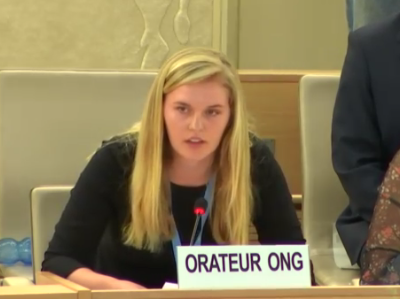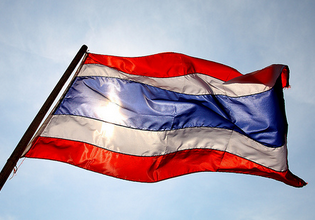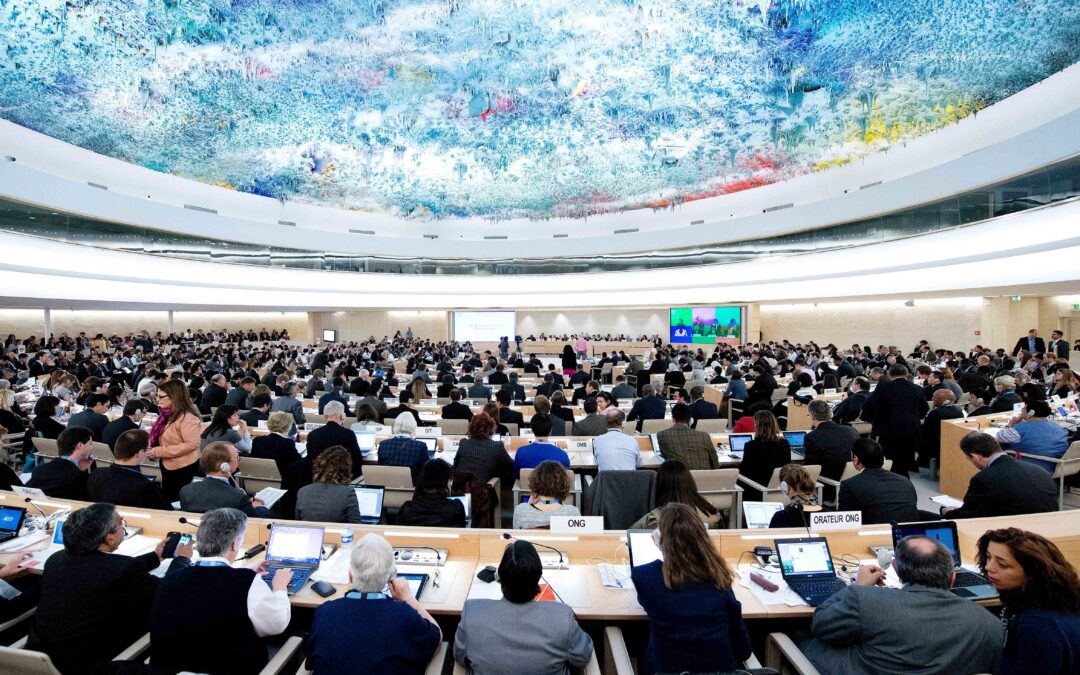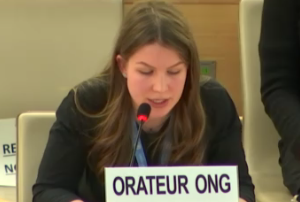
Mar 18, 2019 | Advocacy, Non-legal submissions
The ICJ today called for prompt release of a database of businesses involved in certain activities in the Occupied Palestinian Territory, that has been prepared by the UN Office of the High Commissioner for Human Rights (OHCHR).The statement, delivered in a general debate, read as follows:
“Regarding the Database of business enterprises involved in listed activities in the settlements on the Occupied Palestinian Territory, the ICJ recognizes the important work that has been done, but is deeply concerned at OHCHR’s failure to publicly release it.
All States, including the home States of the companies involved, have a responsibility to prevent companies from operating in breach of international law. Businesses themselves should see the database as an opportunity to more proactively incorporate respect for human rights within their policies and operations.
The prompt publication of the database should contribute to global efforts to hold all business enterprises accountable for their role in violations of human rights and humanitarian law and to give them an incentive to cease in such behaviour. The ICJ urges all States, including those that have supported the creation of this database, to redouble efforts to prevent business complicity in serious human rights abuses and to hold businesses legally accountable when abuses occur in their own territories as well as in the global operations of businesses for which they are the home State.”

Mar 15, 2019
Today, ICJ and Human Rights Lawyers’ Association (HRLA) submitted recommendations to the Ministry of Justice on Thailand’s draft National Action Plan on Business and Human Rights (‘draft NAP’), dated 14 February 2019, scheduled for public consultation between 15 February 2019 and 15 March 2019.
The organizations called for modifications to the draft NAP to ensure adequate legal and other protections for human rights defenders and their work, which was indicated as the identified as one of the NAP’s key priority areas.
The ICJ and HRLA welcomed the overall commitment expressed by the Thai Government, including the Ministry of Justice’s, to implement the United Nations Guiding Principles on Business and Human Rights (UNGPs) through the NAP.
The organizations expressed concern, however, at the removal of a commitment that had been included in earlier versions of the NAP to “push for an Anti- Strategic Litigation against Public Participation (SLAPP) law” from the current draft NAP.
This removal was justified in the draft NAP on the grounds that the Court of Justice had already introduced legal amendments to prevent SLAPP lawsuits, in particular by enacting revisions of the Criminal Procedure Code (Articles 161/1 and 165/2). The draft NAP also refers to certain powers of a public prosecutor as another means of preventing SLAPP lawsuits.
ICJ and HRLA indicated that these laws were inadequate to prevent judicial harassment of human rights defenders and called for the draft NAP to include concrete action with the force of law to protect individuals, and in particular human rights defenders, from judicial harassment, including through SLAPP lawsuits.
Background
Thailand is among the first countries in the ASEAN region to have begun the elaboration of a NAP. The UN Human Rights Council has stressed the importance of the development of National Action Plans by States to implement the UN Guiding Principles on Business and Human Rights, which include the obligation to provide protections for persons from any adverse human rights impact of business activity.
On 15 February 2019, the Ministry of Justice circulated a final draft of the NAP for public consultation.
Upon finalization of the draft following the consultation, the draft will be forwarded to the Office of the National Economics and Social Development Council for their consideration before being sent to the Cabinet for approval.
The draft NAP sets out 4 key priority areas including (1) labour; (2) land, environment and natural resources; (3) human rights defenders; and (4) cross border investment and multi-national enterprises.
The draft NAP has set out several action points aimed to address concerns regarding the above-noted key priority areas for the period of 5 years (2019-2023).
Thailand-SLAPP Analysis-Advocacy-Analysis brief-2019-ENG (analysis in English, PDF)
Thailand-SLAPP Analysis-Advocacy-Analysis brief-2019-THA (analysis in Thai, PDF)

Mar 12, 2019 | Advocacy, Non-legal submissions
The ICJ today highlighted threats to the rule of law in Turkey, Poland, Hungary and Azerbaijan, and the need to address corporate complicity in South Sudan, at the UN Human Rights Council in Geneva.The statement, delivered during general debate, read as follows:
“The situation remains grave for the rule of law and legal protection of human rights in Turkey and Poland.
In Turkey, constitutional reforms in 2017 that undermined the independence of the judiciary should be abolished. Civil society members are prosecuted under overbroad and vague terrorism offences.
In Poland, the Legislature is trying arbitrarily to remove one third of the Supreme Court, a measure that is on hold only temporarily. Unjustified disciplinary proceedings are also being pursued against Polish judges for having sought a ruling of the Court of Justice of the EU.
Elsewhere, in Hungary civil society is ostracized and subject to legislation that risks criminalizing their legitimate activities. In Azerbaijan, as one example of a broader pattern of interference with lawyers and other human rights defenders, lawyer Elchin Sadigov was reprimanded for advising in a confidential manner to his client in detention to complain about torture to which he allegedly had been subjected.
The ICJ is also concerned at the findings by the Commission on Human Rights in South Sudan (A/HRC/40/69, A/HRC/40/CRP.1) that point to the oil industry as a “major driver” in the continuation of the armed conflict and resulting human rights violations. Potential corporate complicity with crimes under international law demand investigation and a strong monitoring mechanism for the use of oil revenues should be established.”

Mar 8, 2019 | Advocacy, Non-legal submissions
Speaking at the UN, the ICJ today urged all States from all regions to participate actively in the process towards a treaty on business and human rights.
The statement, delivered during a general debate on thematic issues at the UN Human Rights Council in Geneva, read as follows:
“Mr President,
The report on the Fourth session of the Intergovernmental Working Group to establish a legally binding instrument in the field of business and human rights opens opportunities for States and the international community to build a multilateral legal framework in this field.
We continue to urge all States from all regions – especially those that have been reluctant to engage- to actively participate in this process.
The ICJ considers that this draft should be based on transparent consultation and participation and respect standards of clarity and precision.
Recent dramatic events in Brazil and South Sudan show the central place that a system of legal responsibility for businesses, including for complicit participation in abuses, should have in an international treaty.
The dam collapse in the Brazilian locality of Brumadhino and the evidence pointing to oil industry complicity with serious human rights violations in South Sudan show the global scale of the problem and the involvement of companies from all corners of the world.
A treaty should also provide to all states a set of common standards effective collective action to guarantee access to justice in a transnational setting.
The creation of an international legally binding framework for States to maximize action and cooperation regarding human rights abuses in the context of business operations remains a compelling necessity of our times.
I thank you.”
The statement may be downloaded in PDF format here: HRC40-OralStatement-GDitem3-2019

Jan 23, 2019
The ICJ and Amnesty International–Canada, have intervened in appeal proceedings before the Supreme Court of Canada in the Case Araya et al versus Nevsun Resources Ltd on appeal from the British Columbia Court of Appeal.
This case concerns a civil suit by Eritrean refugees against Nevsun for its involvement in the commission of forced labour, slavery, torture and other serious breaches of international law against them and many other victim. It is being heard today (23 January).
The joint intervention sets out the basis of the right to an effective remedy under international law and the importance of giving effect to that right in the proceedings of the case and in the development of common law in Canada.
The proceedings before the Supreme Court originate in an appeal by the defendant company Nevsun Resources Ltd against the British Columbia Court of Appeal’s judgment of 2017 which upheld the rights of claimants to sue in Canada.
The company argues that the “act of State” doctrine precludes Canadian courts from sitting to judge the lawfulness or validity of sovereign acts of foreign states, in this case the implementation of Eritrean National Service Programme, within the territory of that state.
The alleged forced labour, slavery and torture had been committed in this context. The company also contends that the claimants’ suit is based on allegations of breach of customary international law rules applicable only to States and which are not recognized under Canadian tort law as applicable to companies.
The ICJ and AI-Canada argue that the development of common law doctrines of judicial abstention and causes of action should be consistent with the right to an effective remedy for human rights violations as protected by international law and the Canadian Charter of Rights and Freedoms. In this line, the company’s grounds of appeal should be rejected or, if accepted, should be made consistent with the full respect to the right of the claimants to an effective remedy.
The claim filed in 2015 argues that Nevsun Resources was involved in various ways in the practice of forced labour, slavery, torture, cruel, inhuman or degrading treatment, and crimes against humanity at the Bisha mine against hundreds of Eritreans who were conscripted into the Eritrean National Service Programe and forced to working in the mine operated jointly by Nevsun and Eritrean State companies.
The claimants, Gize Yebeyo Araya, Kesete Tekle Fshazion and Mihretab Yemane Tekle, three of those who were forced to work in the Bisha mine and fled the country to find refuge in Canada, sued Nevsun alleging private law torts and breaches of peremptory principles of international law (forced labour, slavery, torture, inhuman or degrading treatment, and crimes against humanity).
Contact:
Carlos Lopez, ICJ Senior Legal Adviser, t: +41 22 979 38 16 ; e: carlos.lopez(a)icj.org
Canada-Nevsun AB-Advocacy-Legal submissions-2019-ENG (full text of appeal, in PDF)









